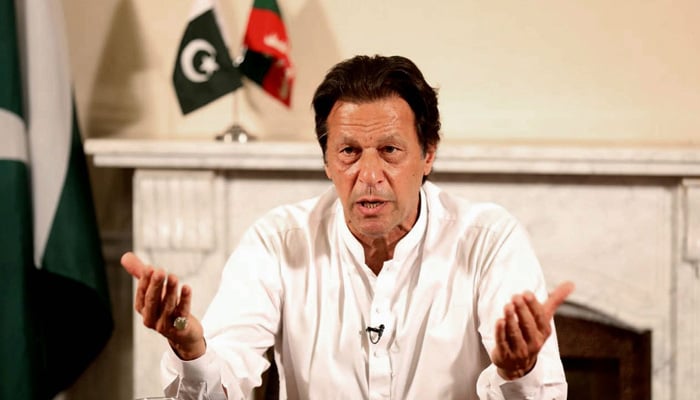Imran Khan’s blessings
There is much focus on the situational curses (challenges) facing prime-minister-in-waiting Imran Khan, but not enough on his blessings (opportunities).
Indeed issues like a coalition government at the centre, widespread allegations of rigging in election results, a strong opposition in the National Assembly and a Senate out of numerical control are formidable obstacles for a government that has ambitious reform and progress ideas. However, Imran Khan will lead a government that is uniquely blessed too.
To begin with, in terms of political support, his government will be spread across three provinces aside from the centre. Its policies can have the kind of national alignment that previously was not available to any other party, recently because of the 18th Amendment’s decentralisation of power and earlier because no party had the type of majority and support available that could carry its word and writ pretty much throughout the country. Plans of action and implementation of policy can therefore have a national reach and can be well-coordinated. With the exception of Sindh, where the PTI faces a comfortably-placed PPP government (though it won’t be averse to streamlining with the centre on critical areas), national agenda setting is now feasible as never before.
Just as important is the fact that Imran Khan’s relatively smaller numbers in the National Assembly and his dependence on coalition partners to stay afloat are off-set by the absence of alternatives that can be put in place to replace his government. For now, the possibility seems distant – to the point of being missing altogether – that in the near future both the PML-N and the PPP could combine their strength and make a pitch to Imran Khan’s coalition partners to pull the rug from under his feet.
This kind of manoeuvre, while a theoretical possibility, has no practical attraction for the small parties that hold the balance in favour of Imran Khan. Almost all of them including the MQM and the BNP-M have signed on with the PTI without deep negotiations with the PML-N or the PPP, whose leadership in turn showed no real intent or purpose of scuttling government formation efforts by the PTI.
The speed with which almost all independents joined the PTI in Punjab – and some even at the centre – is indicative of the trends of the times. The ‘seasoned seasonals’ understand that for a considerable length of time Imran Khan is the way to go in the country’s national politics. This means that he will not have the usual disadvantages associated with running a partner-dependent coalition government and will be pretty much free to take his own decisions.
What cements the bond between Imran Khan’s government and the generally-unreliable coalition partners is the state of affairs of the mainstream opposition. The PPP is nailed down by the cases against Asif Ali Zardari and his sister, Faryal Talpur. The party, whose young voice Bilawal Bhutto Zardari too has gone quiet after the election results, is in no position to throw a spanner in the works of the PTI government. It will make the right kind of noise and at times hold a strong press conference or two, but as long as these cases persist, the PPP would like to relish its fortune in Sindh rather than venture out and try to upstage the political chessboard in the centre. At any rate, whenever in a nutcracker situation, Zardari, the man who calls the real shots, has shown a consistent tendency to duck and dive rather than stand and fight. So that sums up the PPP at present.
Despite its large numbers in Punjab and the National Assembly, the PML-N is placed in a similar situation. On Shahbaz Sharif’s political dashboard legal proceedings in myriad cases are bleeping red. These serve as warnings to him to stay put and do what he does best – nothing. At any rate, he showed his cards clearly – since the time of Nawaz Sharif and Mariam Nawaz’s return from London.
That fateful day’s proceedings (which we now know were carefully choreographed down to precise details, with the primary aim of ensuring that no PML-N worker reached the airport) clearly showed that Shahbaz Sharif has no desire to raise a finger for the narrative associated with his brother and his niece. As he roamed around aimlessly on Lahore’s streets, with many waiting for him to say something or give some direction, he remained tight-lipped and thus created a unique niche for himself in the gallery of leaders who mislead from behind.
Moreover, the PML-N under his quivering command has undergone a sea-change. Its most vocal leaders are now out of the fray and the ones who remain in the core committee are so chastised that they want not a murmur of protest. Many of them are former ministers who have suddenly discovered that they could be in power today if it weren’t for the rhetoric of Nawaz Sharif and Mariam Nawaz. Shahbaz Sharif, of course, encourages this approach and believes that he will survive this narrow bend if he were to be that much more dovish and that much farther from his brother.
With him becoming the leader of the opposition and his son aiming to get the same role in the Punjab Assembly, there are no prizes for guessing what sort of an opposition there will be inside these houses. It will be wing-clipped, tongue-tied, castrated. Imran Khan will have no big issues inside the house when it comes to dealing with the opposition. Yes, there will be noise. Yes, there will be fury. Yes, there will be waving of fists and walk-outs and all that, but under the command of Shahbaz Sharif there will not be an opposition that can stymie a government. This is a great blessing for a government that requires a free path to fulfil its promises and doesn’t want to be tied down by prolonged uproars both in and outside the house.
Imran Khan is also blessed by the rising expectations and support that he has from outside the realm of elected houses. His party’s vote bank has doubled. The nation is exhausted by five years of wrangling (ironically, he spearheaded that phase) and there is a considerably large number of Pakistanis who want to see sanity prevail. The international community, particularly investors and those with high stakes in Pakistan, want a strong, front-led government that is capable of taking tough decisions. And because he is starting his first stint, Imran Khan’s government does not carry the taints and controversies of the past and he can carve a new toehold for the country in many capitals of the world.
And as he does that, he does not have to worry about palace intrigue. His is a rare government that has been baptised and anointed at birth. The fact that Imran Khan’s government is born of what many have seen as a controversial election is now of secondary importance since he has been owned and blessed by every institution in the country. As he starts his stint, he and state institutions are on one page.
This rare development allows him plenty of space in decision-making and in taking policy initiatives. He is blessed because the power bed is made for him to turn his slogans into reality. In a country like ours, with its structural propensity towards political fasaad and endless trickery, these are mighty blessings to have. No one can ask for more than this. No civilian politician has ever got more than what Imran Khan has received. He now needs to double down on the plan to deliver the goods he promised before the blessings run out and old curses take hold.
The writer is former executive editor of The News and a senior journalist with Geo TV.
Email: syedtalathussain@gmail.com
Twitter: @TalatHussain12
-
 Jennifer Garner Drops Parenting Truth Bomb On Teens With Kylie Kelce: 'They're Amazing'
Jennifer Garner Drops Parenting Truth Bomb On Teens With Kylie Kelce: 'They're Amazing' -
 AI Is Creating More Security Problems Than It Solves, Report Warns
AI Is Creating More Security Problems Than It Solves, Report Warns -
 'Game Of Thrones' Prequel 'A Knight Of The Seven Kingdoms' New Ratings Mark Huge Milestone
'Game Of Thrones' Prequel 'A Knight Of The Seven Kingdoms' New Ratings Mark Huge Milestone -
 Apple Seeks To Dismiss Fraud Suit Over Siri AI, Epic Injunction
Apple Seeks To Dismiss Fraud Suit Over Siri AI, Epic Injunction -
 Delroy Lindo Explains The Crucial Role Of Musical Arts In Setting Up His Career Trajectory
Delroy Lindo Explains The Crucial Role Of Musical Arts In Setting Up His Career Trajectory -
 Timothée Chalamet Reveals How He Manages To Choose The Best Roles For Himself
Timothée Chalamet Reveals How He Manages To Choose The Best Roles For Himself -
 Princesses Beatrice, Eugenie’s Conflict Gets Exposed As Mom Fergie Takes Over The Media
Princesses Beatrice, Eugenie’s Conflict Gets Exposed As Mom Fergie Takes Over The Media -
 Kate Middleton Plays Rock-paper-scissors In The Rain
Kate Middleton Plays Rock-paper-scissors In The Rain -
 Lindsay Lohan On 'confusing' Teen Fame After 'Mean Girls': 'I Should Have Listened To My Mom And Dad'
Lindsay Lohan On 'confusing' Teen Fame After 'Mean Girls': 'I Should Have Listened To My Mom And Dad' -
 Savannah Guthrie Mom Update: 'Today' Show Sees Huge Ratings Boost Amid Search For Nancy Intensifies
Savannah Guthrie Mom Update: 'Today' Show Sees Huge Ratings Boost Amid Search For Nancy Intensifies -
 Hillary Clinton To Testify In Epstein Probe Alongside Bill Clinton
Hillary Clinton To Testify In Epstein Probe Alongside Bill Clinton -
 Meghan Markle, Prince Harry End Jordan Trip With Meaningful Hospital Visit
Meghan Markle, Prince Harry End Jordan Trip With Meaningful Hospital Visit -
 AI Boyfriends Gain Popularity In China As Young Women Turn To Virtual Romance
AI Boyfriends Gain Popularity In China As Young Women Turn To Virtual Romance -
 Prince William Receives Reality Check As His Media Strategy Fails
Prince William Receives Reality Check As His Media Strategy Fails -
 Zach Braff Reflects On Doing Odd Jobs Ahead Of Major Career Breakthrough In 2001's 'Scrubs'
Zach Braff Reflects On Doing Odd Jobs Ahead Of Major Career Breakthrough In 2001's 'Scrubs' -
 Google Rolls Out Nano Banana 2 With 4K AI Image Generation
Google Rolls Out Nano Banana 2 With 4K AI Image Generation




